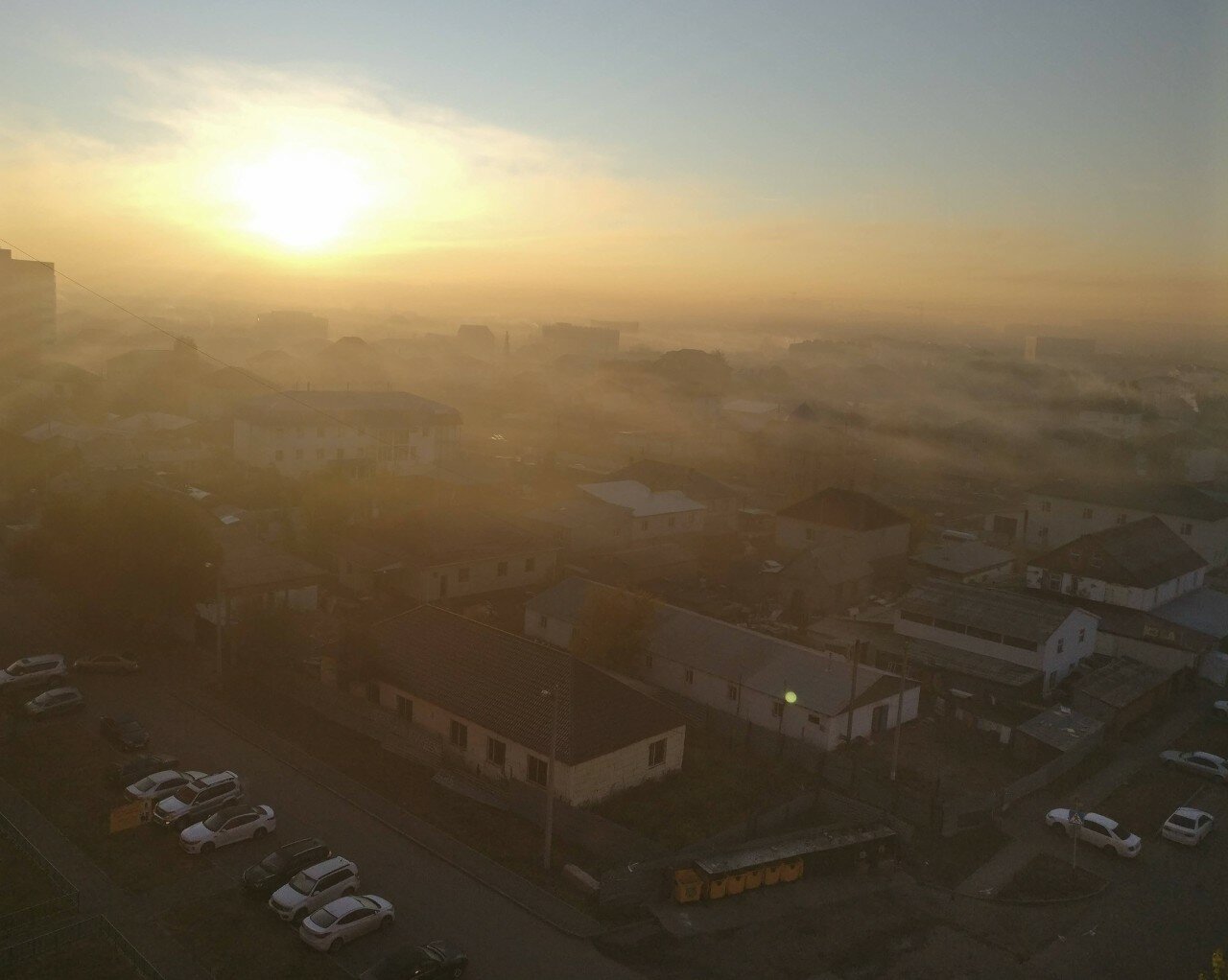Towards Cleaner Air - on the battlefront to trounce air pollution, create healthier human capital
by UNDP Kazakhstan | Originally posted on 3 October 2021
Photo credit: Serafima Shabelnikova, Almaty, Kazakhstan, 2024
Air quality is an important issue to address because more than 70 percent of the world’s population will live in cities by 2040. Alarmingly, polluted air causes higher mortality than smoking, decreasing life expectancy by 2.2 years compared with 1.92 associated with smoking. Air pollution is detrimental to the most vulnerable, putting them at an even higher risk of illness during the COVID-19 pandemic.
Today air quality in urban areas substantially exceeds World Health Organization (WHO) and European Union standards. It is one of the risk factors for noncommunicable diseases (diabetes, cardiovascular diseases, cancer, and respiratory diseases) that are leading mortality causes in Kazakhstan. Research shows that around 16,000 deaths per year are associated with diseases attributable to air pollution in Kazakhstan. It is imperative to address this high number of cases by tackling air pollution comprehensively.
Table 1 Air pollution shortens lives more than any other external cause

Today Nur-Sultan, Karaganda, Temirtau, Oskemen, Almaty, Balkhash, Shymkent, Atyrau, Aktobe, and Zhezkazgan are cities with the most polluted air according to the Kazhydromet[1]. The causes of air pollution are threefold: heavy industries and power stations using coal; residential buildings using solid fuels in heating stoves; and transportation that is outdated and does not meet emission standards. Almaty, for example, is the city with the highest number of registered cars - about 470 000 at the end of 2019. With more people moving into cities, increased urbanization will bring even more traffic and energy needs which will have a further negative impact on the environment.
Air pollution is not unique to Kazakhstan – it is a shared problem among the countries of Europe and Central Asia. Air pollution transcends borders – it is a complex issue that requires cooperation between countries, a shared vision, and coordinated action. These countries can work together to avoid the heavy economic costs of premature death and disease from air pollution, a tally of US$1.6 trillion every year, according to WHO.
Kazakhstan has made steps towards a greener future with better air quality. In 2024, President Kassym-Jomart Tokayev announced that Kazakhstan is committed to achieving carbon neutrality by 2060. The new Environmental Code requires factories to use innovative technological practices that will minimize harm to the environment. This is a common practice internationally when the government can issue a permit only if the factory is adopting the best available technological practices. These practices are not only linked to technology, they can be organizational and managerial solutions that allow the industry to improve their efficiency while decreasing emissions into the soil, air, and water. The new Environmental Code incentivizes factories to adopt the best available technologies to protect the environment.
Another positive trend outlined in the new Environmental Code is the management of payments coming to the local budget as a pollution charge from the industries and factories. Previously, these payments were collected by the local government to finance various needs of the city with only up to 45 percent of the charges used for environmental purposes. The change states that now 100 percent of the charges must be used to finance the activities aimed at improving the local ecological situation, including air quality. This will open up additional channels of financing activities to protect the environment.
UNDP Kazakhstan is implementing the City Experiment Fund (CEF) project to address the issue of air pollution in Almaty. Almaty is in the network of learning together with other cities in the region: Stepanavan (Armenia), Prizren (Kosovo), Pljevlja (Montenegro), and Skopje (Republic of North Macedonia). In these cities, UNDP Europe and Central Asia are introducing innovative approaches to urban challenges that are relevant for each city. While the Stepanavan team is introducing multi-sector interventions to boost economic activity, Prizren is exploring creative industries, Pljevlja is creating spaces to attract youth, while the CEF project in Almaty is focusing on air pollution.
UNDP Kazakhstan Accelerator Lab is joining forces with local actors in Almaty to create an Eco-Data Centre that will collect, analyze and visualize data on air quality. The team is bringing together actors whose data is complementary to each other using edge computing, neural networks, and remote sensing. The Eco-Data Centre will source data from satellite imagery, sensors, and transportation flows using the latest technologies. It will represent a new platform to unite government, private sector, international organizations, and members of the public to address air pollution.
The Data Centre will provide opportunities for citizens to share their ideas and recommendations on improving air quality and the overall ecological situation in Kazakhstan in a gamified manner. Access to real-time data and crowdsources ideas from the members of the public will be used in decision-making and inform policies on air quality.
UNDP Kazakhstan’s Accelerator Lab team is leading this work together with its international partners inside and outside UNDP: the goal is to bring together data, digital solutions, and innovative finance methods and to adapt them to the local context for better air in Almaty. UNDP Kazakhstan is already working with Almaty municipality, both on the digital and green economy fronts. As a result of this three-year project, UNDP Kazakhstan will compile lessons on how to use data innovation for the public good in the area of air quality. In the future, the team hopes to scale up the Eco-Data Centre to other major cities in Kazakhstan.
UNDP Kazakhstan is committed to building resilience to climate change and economic and social challenges that come as a result of anthropogenic activities. Addressing air pollution will contribute to the ongoing efforts of UNDP Kazakhstan to promote low-carbon urban development.
[1] Kazakhstan’s national hydrometeorological service under the Ministry of Ecology, Geology, and Natural Resources of the Republic of Kazakhstan.
Article retrieved from https://www.kz.undp.org/content/kazakhstan/en/home/stories/2021/towards-cleaner-air.html
